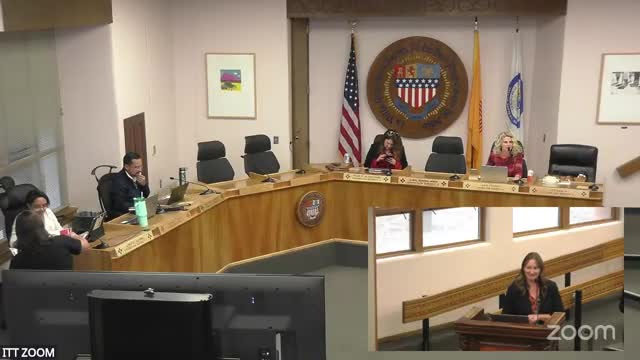Santa Fe Community College says Apprende apprenticeship is expanding early‑childhood workforce
Get AI-powered insights, summaries, and transcripts
Subscribe
Summary
Presenters told the City of Santa Fe Quality of Life Committee that the Apprende early‑childhood apprenticeship, funded by ARPA, has placed dozens of new educators in local classrooms, improved classroom staffing and is seeking funding to continue after its contract ends in December 2026.
Santa Fe Community College officials presented evaluation results Oct. 22 to the City of Santa Fe Quality of Life Committee showing the Apprende apprenticeship program has produced new early‑childhood educators, supported workforce retention and increased classroom staffing.
The external evaluation and program managers showed the program—funded with $900,000 in American Rescue Plan Act (ARPA) dollars in 2022—has produced measurable placements and training outcomes and is approaching the end of its contract, which city staff said is scheduled to be expended by Dec. 31, 2026.
Katrin Allred, executive director of the Early Childhood Center of Excellence (ECHO) at Santa Fe Community College, told the committee the program uses a three‑pronged apprenticeship model that links college coursework, employer‑based mentoring and a competency rubric to on‑the‑job performance. "This is the state's first education‑related apprenticeship," Allred said, describing the program as a pipeline both to recruit new workers and to support retention among existing staff.
Crystal Sanchez, Apprende program manager, said the program offers a pre‑apprenticeship practicum (up to about 150 hours per semester) and a registered apprenticeship that combines demonstrated competencies, 2,000 hours of on‑the‑job work and college coursework. "I would never have tried college without the Apprende program," Sanchez said, quoting a participant who described the program's stipend and wrap‑around supports as decisive.
Program numbers presented to the committee included: 63 pre‑apprentices enrolled since fall 2022; 38 people have applied to the registered apprenticeship since spring 2023; two apprentices had completed the registered apprenticeship at the time of the presentation; and about 64% of pre‑apprentices converted to apprentices. Presenters reported roughly 31 new educators placed in Santa Fe classrooms as a result of the pre‑apprenticeship pipeline and said about 800 children had been served in classrooms with apprentices.
Presenters described the registered apprenticeship as competency‑based, with apprentices assessed against a rubric of roughly 147 skills. Allred and Sanchez also said some apprentices follow alternate pathways: a small number hold unrelated bachelor's degrees and use alternate‑licensure routes; others finish their AA and continue toward a BA. Presenters said three apprentices were pursuing alternative licensure and four former apprentices had completed AAs and were working on bachelor’s degrees.
Committee members pressed staff on barriers and sustainability. Councilor Lee Garcia asked what prevents people from entering the program; Sanchez and Allred pointed to financial tradeoffs (stipends are not full wages), recruitment challenges and childcare access. "Recruitment is probably our biggest challenge," Allred said, noting some applicants cite citizenship/documentation as a barrier.
On funding, Sandra Emery, program manager for youth and family services, and Allred said Apprende has additional private philanthropic support (a no‑cost extension on a foundation grant), outreach to the county about joint funding, applications to the New Mexico Early Childhood Education and Care Department (ECECD), and an application for federal funding through U.S. Senator Martin Heinrich's office that had progressed but stalled because of a federal funding disruption. The presenters said the city’s ARPA allocation remains critical and that the college is pursuing multiple sources to sustain the program beyond the 2026 contract end.
Committee members and staff discussed potential city funding in the FY27 budget. During questioning, a committee member said a figure of roughly $300,000 per year was under discussion as one possible local contribution; staff replied that level would allow for some program growth but did not provide a final funding commitment.
Presenters and councilors highlighted qualitative outcomes: employers report the program helped keep classrooms open when substitutes were unavailable, apprentices increased the number of adults available for small‑group or one‑on‑one attention, and bilingual coursework at SFCC helps produce a workforce able to serve Spanish‑speaking families. Allred noted the program has also brought more men into the early‑childhood workforce at SFCC's Kids Campus.
The presenters asked the committee to note the evaluation's finding that stipends and wrap‑around supports were central to participants' ability to enroll and complete coursework. They also asked the committee to consider the long lead time required for apprentices (often two to three years) when evaluating program impact.
The program managers said they will continue outreach to county and state partners and to private foundations as they prepare for the contract's final year. Councilors expressed support and asked staff to include Apprende in upcoming budget conversations.
Sources: Presentation and Q&A at the Quality of Life Committee meeting Oct. 22, 2025; external evaluation summarized to the committee by program staff.
